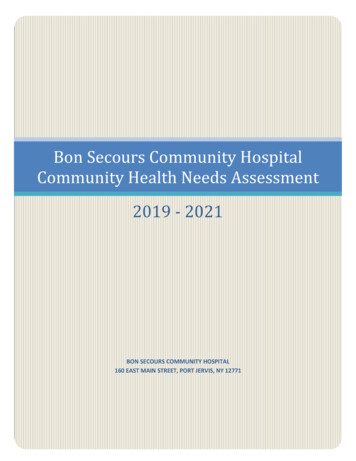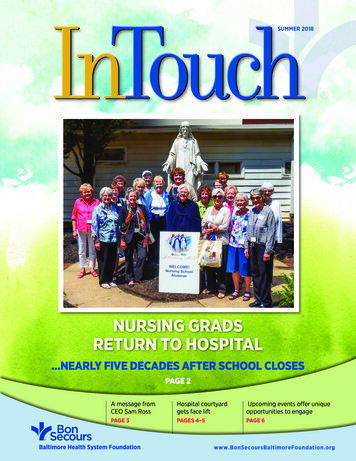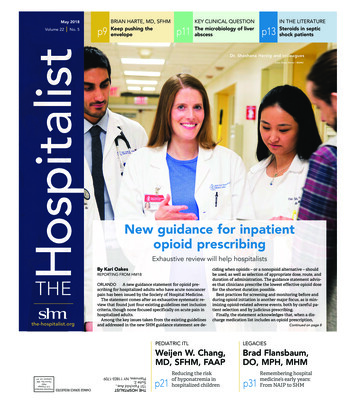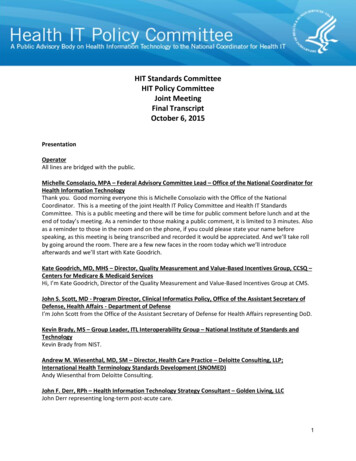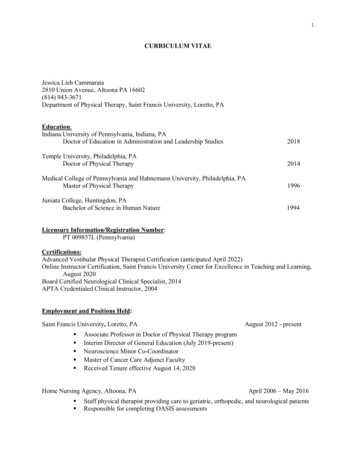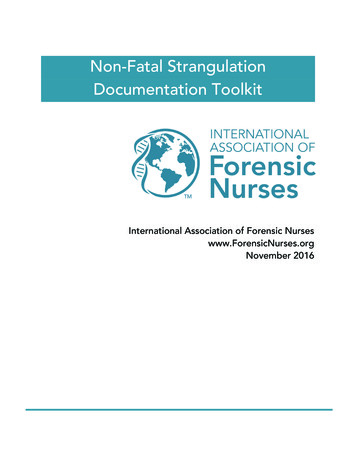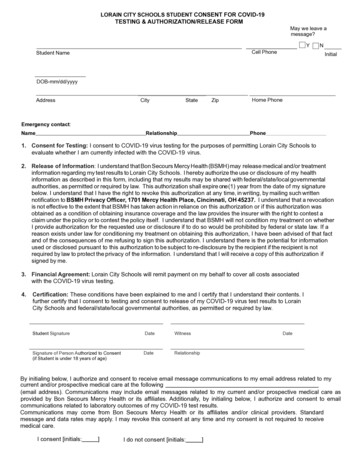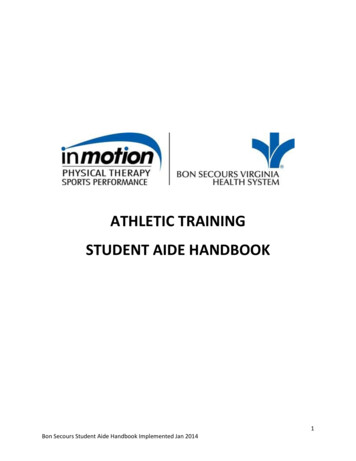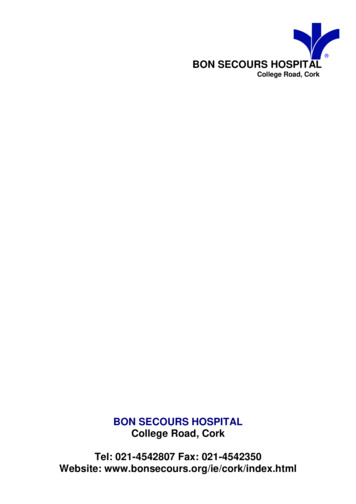
Transcription
BON SECOURS HOSPITALCollege Road, CorkBON SECOURS HOSPITALCollege Road, CorkTel: 021-4542807 Fax: 021-4542350Website: www.bonsecours.org/ie/cork/index.html
BON SECOURS HOSPITALCollege Road, CorkEssential Information forPatientsBon Secours Hospital, Cork
BON SECOURS HOSPITALCollege Road, CorkBon Secours Hospital, Cork
ContentsIntroduction . 4Charter of Commitment . 5Car Parking . 6On Arrival at the Hospital . 6Health Care Insurance . 6Accommodation . 7Bed and Ward Transfers . 8Personal Items Checklist . 8Your Personal Belongings . 9Visiting Policy . 9Hospital Staff . 10Patient Diet, Nutrition and Meal Times . 12Safety in a Hospital Environment . 12Preventing Falls . 14Smoking Policy. 14Preventing Infection . 15Your Right to Confidentiality . 16Participation in your Care . 16Decisions about your care . 17Consent . 18Cardiopulmonary Resuscitation . 191
Pain Management . 19Patient Advocacy . 19Medication . 20General Information & Services Provided . 22Information for Surgical Patients . 25Patient Satisfaction . 27Conflicts, Differences of Opinion, Complaints . 27Accessing Your Records . 27Discharge Planning . 28At Home . 29Advice for Paediatric Admissions . 30Useful Telephone Numbers . 38Specialist Services Available . 39Local Area Map . 40"GOOD HELP TO THOSE IN NEED"2
Welcome to the Bon Secours Hospital CorkAs our patient at the Bon Secours Hospital Cork, our goal is to ensure that during yourstay here, you are provided with the highest standard in healthcare. We aim towardsoutstanding patient care in an environment where it is our mission to bring "good help"to all our patients.Because we are committed to excellence in healthcare, we know that outstanding careinvolves more than good medicine and that is why this extends to every part of yourstay. Our goal is to provide you with quality care and make your hospital experience assafe and comfortable as possible. Our medical team are committed to ensuring yourwell being, in a welcoming and informed environment.The information in this patient booklet will familiarise you with hospital services andpolicies and will answer many questions you may have during your hospital stay. If youhave questions that are not outlined in the handbook, please do not hesitate to requestassistance from any member of our healthcare team or contact reception at ext 1600.On behalf of everyone who works here, I would like to welcome you to the Bon SecoursHospital Cork.SincerelyHarry CanningHospital ManagerBon Secours Hospital Cork3
IntroductionOur goal at Bon Secours Hospital Cork, founded in 1915, is to provide the highestquality of care and service to meet your healthcare needs. This handbook has beendeveloped as a source of information for all patients being admitted to the hospital, toinform you of your rights and to protect and advance your rights and those of yourfamily. During your hospital stay, your care is guided by best practice policies andprocedures which have been devised to ensure that your care is delivered in a uniformmanner and within business, financial, ethical and legal norms. Bon Secours Hospitalsare located in Cork, Tralee, Dublin and Galway. The Care Village is located in MountDesert, (St Joseph's)Mission Statement of the Bon Secours Health SystemFounded by the Sisters of Bon Secours, our hospitals have as their mission, care forthe sick, the dying and their families within a Catholic ethos.Inspired by the Gospeland sharing in the healing mission of Jesus, we recognise the dignity and uniquenessof each person, seeking to provide high quality, holistic care which is characterised bycompassion, respect, justice and hope.The Bon Secours Values are: Respect,Justice, Integrity, Stewardship, Innovation, Compassion, and Quality.History of the HospitalThis Hospital opened its doors in 1915. In the intervening years, there have been anumber of major developments in its growth. Now, it is one of the largest independentCatholic Hospitals in Europe with 344 beds, catering for up to 18,200 admissions, and23,000 outpatients attendances each year.4
Charter of Commitment of Bon Secours Healthcare SystemOur commitment to you Access to care in a safe and secure environment free from any type ofdiscrimination on the basis of age, race, gender, marital status, religious belief,sexual orientation, disability or family statusConsiderate and respectful care that will enhance the patient’s comfortProtection of privacy and confidentiality of information related to medical careClear and concise explanation of the patient’s condition, proposed treatmentsor procedures, the benefits and any potential risks of proposed treatments,expected recuperation and the likelihood of success of treatments orproceduresWillingness to let the patient and family take the lead in decision makingregarding their care and treatmentChaplaincy Services are available to allAttentive courteous responses to any concerns the patient or family may haveDiagnostic tests not available at the hospital will be conducted at other sites.The patient will be informed by the nursing staff if this need arisesIn the event of a patient developing a serious complication, transfer to anapproved tertiary hospital will be arrangedYour commitment to us Attend the hospital at your appointment time and bring any relevantinformation given to you by your Consultant or General Practitioner If you are unable to attend for your appointment, notify the hospital as early aspossible In order to determine appropriate care, you will be asked to provideinformation to healthcare staff. Please answer as fully and honestly aspossible Inform the Consultant/Registered Medical Officer/Nurses of any treatment youare receiving or any medication you are already taking Obtain permission from the nursing staff on your ward before leaving the ward Treat staff, fellow patients, carers and visitors politely and with respect. We willnot accept violence, racial, sexual or verbal harassment Complete insurance reimbursement forms (if applicable) Settle the hospital account before departure Observe the hospital ‘No Smoking Policy’ Help us maintain high standards of safety, hygiene and tidiness in the hospitaland grounds.5
Car ParkingWhere possible you should try to arrange for a relative or friend to bring you to andfrom the hospital.Car parking is available, payable locally at Pay and Displaymachines located at various points throughout the hospital car park. Charges applybetween 7.00 a.m. and 10.00 p.m. Street disc parking is also available and parkingdiscs maybe purchased in the Hospital Shop.A number of disabled car parking spaces are available however a valid disabled vehiclepermit must be displayed.There are “drop off” or “set down” spaces located to the front of the hospital.On Arrival at the HospitalPlease report to reception. A Wheelchair is available from the reception staff shouldyou require one. You will be asked to take a seat for a short time in the waiting areabefore proceeding to the admissions office.The Admissions Staff will help youcomplete the relevant documentation.Health Care InsuranceWe advise you to please check your exact level of cover prior to admission by callingour Health Insurance Enquiry Helpline 1890 1300 27 or by calling your insurancecompany directly. Please be aware that: many insurance plans now have shortfalls that are payable by patients. Youwill be required to pay any shortfalls prior to admission. healthcare insurers may not cover your stay if they deem the admission notmedically necessary or they may only cover part of your hospital stay. It isadvisable to discuss your planned admission with your insurers prior to yourhospitalisation.6
On the day of your admission, please bring with you as appropriate: Health Insurance Plan and membership number. Garda Medical Aid Plan and membership number. E.S.B. number and scheme Any other relevant insurance details.Billing of Consultant’s Professional BillingDepending on your insurance plan, Consultants involved in your care may bill youseparately from the hospital. These Consultants can include: anesthetists, surgeons,physicians, cardiologists, radiologists, pathologists and other specialists. If you haveany questions regarding these bills you should call the Consultant’s offices directly atthe telephone numbers listed on the statement sent to you.AccommodationPatients admitted are facilitated in either a private or semi-private room depending ontheir insurance cover, availability or in response to special needs.If you requireaccommodation which is not covered by your insurance, this may be facilitatedfollowing discussion with the Patient Accounts Department.Day Ward AdmissionsThe day wards (such as Endoscopy, Angiography, Oncology and St Michael’s dayward) have arrangements specific to their elective admissions and you will be advisedof these arrangements prior to admission.7
Bed and Ward TransfersDue to the demands of providing best medical and nursing care to all patients, it maybe necessary to transfer patients from one part of the ward to another or perhaps toother wards.While every effort will be made to keep movement of patients to aminimum, we would be grateful for your co-operation should you be requested to move.Personal Items ChecklistPrior to your admission we suggest that you check that you have the following packed:Comb /HairbrushToiletries (toothpaste, toothbrush, shaving / washing items, etc.)Pyjamas / NightdressDressing Gown & Slippers (non slip)Spectacles, Contact Lenses, Dentures, Hearing Aid (including containers foreach of these)X-raysReading MaterialAll Medications and herbal supplements you are currently takingMedical Information including a list of any allergiesSmall amount of cash for sundry items8
Your Personal BelongingsWhilst a security officer is on duty 24 hours a day and the hospital’s security system isdesigned to protect patients and staff, we cannot be responsible for the loss ofvaluables.Please leave money, jewellery or any other possessions you considervaluable, at home. If you do come to the Hospital with such valuables, please see thata member of your family returns them to a place of safety.Please ensure that you lock your valuable items (mobile phone, cash) in thewardrobe/locker provided when you leave your room. Do not leave valuable itemsunattended.The hospital does not accept responsibility for loss of personal belongings.Visiting PolicyFamily and friends can help speed your recovery. During your hospitalisation, ourobjective is to provide an environment that promotes healing and provides a positiveexperience for you and your visitors.Patients, except those in the ICU, may receive visitors during the following hours: General:2.00 p.m. to 4.30 p.m. and 7.00 p.m. to 9.00 p.m. Children’s Ward:See page 34.For the Intensive Care Unit, visiting is confined to the immediate family and must bearranged with the Clinical Nurse manager.Family and friends are asked to avoid visiting if they have vomiting and/ordiarrhea in the last 48 hours, colds or other infectionsVisitors are asked to use the alcohol gel provided to clean their hands before visitingyou, to keep to the times and avoid making unnecessary noise in the rooms andcorridors. After 6.00 p.m. visitors can access and leave by the main entrance door.9
Hospital StaffOur Hospital is staffed around the clock by highly skilled personnel working together toprovide you with the best treatment and care available. The Hospital has a Consultantmedical staff of 70 and 980 other staff, including House Doctors, Nurses (both qualifiedand students), Pharmacists, Radiographers, Laboratory Staff, Physiotherapists,Occupational Therapists, Dietetics, Clerical, Household, Catering and MaintenanceStaff. The Hospital is a teaching hospital and is affiliated with the UCC School ofMedicine and School of Nursing.All staff wear a name badge for identification and security purposes. Expectstaff to introduce themselves when they enter your room and look for theiridentification badges.You may find the following helpful in recognizing some of the staff members who youmay come into contact with during your stay.UCCClinical NurseManager II / ClinicalNurse Specialists10Clinical NurseManager IStaff NurseUCCStudent Nurse
House DoctorPHYSIOPhysiotherapistDietitianHealth e NameBadge11
Patient Diet, Nutrition and Meal TimesOur experienced catering and dietetic teams have created a varied menu to cater foryour nutritional needs. Please make your Nurse or Doctor aware of any food allergies,intolerances or special dietary requirements you have. Our Dietitians are available toadvise on therapeutic diets during your stay.Breakfast7.45 a.m. to 8.45 a.m.TeaandcoffeeisLunch12.30 p.m. to 1.30 p.m.served at 10.00 a.m.Tea5.00 p.m. to 6.00 p.m.and again at 7.30 p.m.See “General Information and Services Provided” for information on the Hospitalrestaurant.Safety in a Hospital EnvironmentYou have a right to protection from harm during your hospital admission. In this regardpolicies, procedures and guidelines have been developed to standardise practiceswithin the hospital, which include: protection of the patients from physical assault, careof children, care of the aged patient, care of the mentally and physically compromisedpatient and others.The Hospital environment is obviously quite different from your home environment. Foryour safety, the hospital staff would like to point out some of these differences. Weneed your help in making your stay as safe as possible, so please note the following: Remember that hospital beds are narrower and higher than beds at home, sobe careful turning and getting in and out of bed. Remember that most of the furniture in your hospital room is on wheels, sodon’t lean on it unless you know it is secure. There is a nurse call bell button beside your bed and in the bathroomswhich rings at the Nurse’s station. Use your nurse call bell when youneed any assistance.12
If you have a room-mate who asks for assistance, notify the Nurse beforehelping him/her. Wear shoes or slippers when out of bed. Flip-flops are not permitted. Your name, address and date of birth will be your unique identifier while inhospital and staff are required to check and re-check this with you prior to anyprocedure/treatment. You are also issued with a unique identification numberwhen being admitted and this number is yours during all admissions. Makesure staff members confirm your identity by either checking your wrist band orasking your name before administering any medication or carrying out anytreatment. If you think you have been confused with another patient inform astaff member immediately. Hand washing is the most important way to prevent the spread of infections.Don’t be afraid to remind a Doctor or Nurse to wash their hands. For moreinformation, see “Preventing Infections”. Inform staff of any allergies that you may have (penicillin, peanuts, latexgloves, etc.). Please read the prevention of falls leaflet and take the time to watch the FallsPrevention Video on Channel 17 of the Hospital multichannel system. Formore information, see “Preventing Falls” Inform the Clinical Nurse Manager if you want to leave your nursing area. Do not bring hot water bottles and electric blankets to hospital as they are notallowed. Report immediately any faulty equipment in your room. In the event of a fire, follow instructions of our staff, stay calm. Fire exits areclearly marked. Each ward has a fire alarm. Do not use the elevators in theevent of a fire. Smoking is not permitted in the hospital including the use of e-cigarettes(electronic cigarettes). For more information, see “Smoking Policy”.13
Preventing FallsIt may be that you are at risk of falling sospecial precautions will be taken by staffto reduce such a risk and we ask for yourcooperation in this process. There is aleaflet available with your admissionpacket which will give you some tips onpreventing a fall.A falls awareness video is on Channel 17 of the hospital multichannel network.Children have the additional risk of falling due to their stage of growth anddevelopment, however while in hospital your child may be at an increased risk of fallingdue to a new environment, medication or underlying medical or surgical condition. Weaim to create and maintain a safe caring environment for all children. We encourageyou as parents / guardians to assist in maintaining your child’s safety by: Making sure that the cot sides are always up fully and secure, even if you areonly leaving your child for a few seconds. Ensure that your child is properly secured in his / her buggy or high chair. Ensure your child is accompanied to the bathroom after surgery or when theyhave an intravenous drip. Ensure that your child wears non slip footwear when walking around the ward.Smoking PolicyThe hospital is a smoke free facility. Smoking is not permitted on the premises unlessyou are in a designated smoking area (near the main entrance).reasons, the use of e-cigarettes (electronic cigarettes) is prohibited.14For fire safety
Preventing InfectionThe prevention of healthcare associated infection is a key patient safety issue. OurInfection Prevention and Control Team, led by the Consultant Clinical Microbiologist,runs an extensive Infection Prevention and Control Programme which is based on bestpractice and the most recent national and international guidelines.There are also certain things that you as a patient can do in order to further reduce therisk of infection and help our team stop the spread of infection: Hand Hygiene is the most effective method of preventing the spread ofinfection. If you think someone has forgotten to wash their hands, please donot be afraid to remind them. If you have been told that you have VRE or MRSA that you inform yourConsultant, ideally prior to your admission. This will not affect your admissionor your procedure but will allow the hospital to put any necessary measures inplace both for your own protection and that of other patients. If you have vomiting or diarrhoea within 48 hours of your planned admissionplease inform our admissions staff prior to your arrival. Please ask friends or family who have colds, stomach bugs or other infectionsnot to visit you in hospital. Please ask that your visitors do not sit on your bed or other patient's beds. You may have nose or skin swabs taken by your admitting Nurse. These maybe repeated during your stay. In the event of any building works taking place immediately outside your wardwe ask that the windows remain closed in an effort to prevent the spread ofany fungal infections that can have serious implications for sick patients.15
Your Right to ConfidentialityYou have the right to privacy and can expect your privacy to be maintained during anyexaminations, interventions or procedures. Discussions about your care and treatmentshould take place in a private and confidential manner.Patient information isconfidential and staff of Bon Secours Hospital adhere to policies which protect thisinformation.Participation in your CareCan you please tell me more about my condition?Why do I need to have this particular test?What are the different treatments for this condition?What are the risks of this treatment?What should I look out for?What can I do to help myself?Your admission has been arranged because your Consultant feels that Bon SecoursHospital can meet your care needs. You have the right to be fully involved in your careand treatment.We recognise that the patient is central to the care process and yourparticipation will be supported and promoted if you so wish. If you would like yourfamily to participate in your care, this will also be respected.Prior to your admissionyour Consultant should have discussed the purpose of your admission, treatmentsplanned, the appropriate length of your stay and the expected benefit of anytreatments.During your hospital stay, you have the right to be informed of the following:16 any results of investigations undertaken planned treatment which may be required to meet your needs. details of your diagnosis or details of your medical condition course of treatment
whether further referral is required possible pain and discomfort which you may have risks and side-effects of treatment or medications prospects for your recoveryDuring these discussions, you will be given the opportunity to ask any questions orvoice any concerns you may have. For patients having surgery, the Anaesthetist willdiscuss the potential risks of having an anaesthetic.Decisions about your CareAll patients have the right to be involved in decisions about their care.Ultimatelypatients have the right to refuse or discontinue treatment having discussed the possibleconsequences and any treatment alternatives with your Consultant.If you are currently participating in an external clinical trial, please notify yourConsultant or Nurse of this so that your continued participation may be facilitated.For patients who are admitted to Bon Secours Hospital for palliative care or who haveother terminal illnesses, it may not always be appropriate to continue with life sustainingtreatments or initiate resuscitation and patients have the right to express their wishesand preferences in this regard. It may be necessary and appropriate to include familymembers in this discussion with the Consultant so that decisions about care will beagreed together.When ethical considerations or personal dilemmas arise, staff will be guided by BonSecours Healthcare System Ethics Committee.Patients have the right to donate organs if they so wish and the hospital supports theNational Organ Donation Programme and has Organ Donation cards available.17
Should this situation arise, it would be necessary to liaise closely with the NationalTransplant Coordinator in Beaumont Hospital.Each patient has the right to compassionate and respectful care at the end of life, andBon Secours Hospital considers it essential that all patients who are at the end of theirlife deserve a compassionate, peaceful and painless death.ConsentHow will this procedure help me?What are the possible risks of the surgery and what are the chances ofthese happening?Are there other ways that this condition could be treated?What will happen after the surgery/procedure?How long will I be in hospital?When you present for admission, your general consent to care as directed by yourConsultant is assumed. This care may involve examinations, laboratory testing, x-rays,scans, out-patient procedures with local anaesthetic, the administration of medicationand nursing or other healthcare interventions relevant to your condition.You can expect that each intervention proposed will be explained to you by yourConsultant or by a member of your healthcare team.You will be asked to sign an informed consent form in circumstances where you requiresurgical intervention, for certain types of treatment, tests requiring anaesthesia orsedation, chemotherapy, use of blood or blood products and participation in clinicaltrials, investigations or research. These tests or procedures will have been explainedby your Consultant. If you do not understand the procedure or test you are asked toconsent to, tell your Nurse and your Consultant will be notified. It is important for you tounderstand the risks, benefits and alternatives available to you whenever you are18
undergoing anything other than a minor test (chest x-ray) or treatment (intravenousfluids).Parents of children under 16 years will be required to sign consent on theirchild’s behalf. (See advice for Paediatric Admissions on page 35).If you wish to withdraw your consent to any intervention, please inform your Consultantor attending Nurse and your wishes will be respectedCardiopulmonary Resuscitation (CPR)All patients admitted to the Bon Secours Hospital will receive cardiopulmonaryresuscitation in the event of a cardiac or respiratory arrest, unless a Not for CPR orderhas been signed. Please discuss any specific requests in relation to CPR with yourConsultant.Pain ManagementIf you experience any pain during your hospitalization, you have the right to have yourpain assessed and managed while in hospital. A pain assessment is carried out on allpatients during their admission assessment.An information leaflet on PainManagement is available.If you feel at any time that your pain is excessive, inform your Consultant or Nurse andthis will be investigated further.Patient AdvocacyIf you feel that you need support when in hospital: Ask a trusted family member or friend to speak on your behalf if you so wish. He/she can ask questions that you may not think of.19
He/she can also help remember answers to questions you have asked andspeak up for you if you cannot.Make sure this person understands yourpreferences for care and review consents for treatment with them before yousign them.MedicationWhat is this medication for?What do the directions on the label mean?How much should I take and when should I take it?What should I look out for?Will this medicine interact with other medications I am taking or food?The hospital operates a policy to use patient's own medication during your stay in theBon Secours Hospital. To ensure there is no interruption to your medication, pleasebring all your own medication in with you when you come to hospital. These mayinclude tablets, liquid medicines, creams, eye drops, inhalers and any over the countermedicines you are taking. Bring them in their original containers.What will happen to your medication while you are in the Bon Secours Hospital?On your admission to hospital a registered nurse and/or a pharmacist will assess allyour medication against a hospital policy. This assessment will deem your medication"suitable” or "unsuitable” for use during your stay in the Bon Secours hospital.If your medicines are deemed suitable for use; they will be stored in a locked bedsidecabinet and administered to you during your hospital stay, with your permission.If your supply of medicines are used up during your stay, you will be administeredmedicines from the hospital supply.20
If your medicines are deemed unsuitable for use; this will be explained to you. Themedicines will be stored in a locked cabinet until you can send these medicines homewith a relative or friend. You will be administered medicines from the hospital supply.What if you are prescribed new medication which you were not taking at home?You will be administered medication from the hospital supply of medicines while aninpatient. The doctor will give you a prescription on discharge. You will not be givenany medicines on discharge. Your GP will be informed of the new medication so that,he or she can continue to prescribe it for you when you are at home.What will happen to your own medication on discharge from Bon SecoursHospital Cork?Any of your own medication that is not used will be returned to you on discharge. Anyof your own medication which has been discontinued or changed by your doctor whilein hospital will be returned to the hospital pharmacy for safe disposal, with yourpermission. If you do not give permission to dispose of the old medication, you will beadvised to return them to your local pharmacy for safe disposal.If you have any questions in relation to medications prescribed, please ask your nurseand/or ward pharmacist.21
General Information & Services ProvidedRestaurantThe restaurant is located on the ground floor near the main reception desk and servesa wide variety of hot meals, sandwiches, salads, soup etc.Open Daily7.30a.m. to 7.00p.m.Breakfast (cooked)7.30a.m. to 11.15a.m.Lunch (including Carvery)12.00p.m. to 2.30p.m.Evening Meal5.00p.m. to 6.45p.m.TelevisionThere is a television in every room supplying a variety of television channels. You arerequested not to adjust sets and to inform Nursing Staff if adjustment is necessary.TelephonesThe hospital telephone number is (021) 4542807. A telephone is situated besideeach bed for receipt of incoming calls. Outgoing calls can be made with a call card.Telephone cards available from the General Accounts Office (ground floor, adjacent tothe reception desk) between 9 a.m. and 4.30 p.m. and from Reception after this time.ChiropodyA chiropody service is available in the hos
BON SECOURS HOSPITAL College Road, Cork Tel: 021-4542807 Fax: 021-4542350 . The patient will be informed by the nursing staff if this need arises . Staff. The Hospital is a teaching hospital and is affiliated with the UCC School of Medicine and School of Nursing. You may find the following helpful in recognizing some of the staff members .
